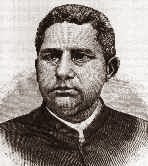by Andre E. Johnson
R3 Editor
We made Tuesday a day of special prayer and God, at my request, suggesting me a text: the words of it were, “Lord, Help Me.” We tugged at it an hour and a quarter. The text seemed freighted with such convincing arguments of man’s incapacity to help himself, that I could see that numbers had resolved to rely upon God. Finally, an invitation was given to all seekers for salvation, to approach and bow around the altar. In an instant scores came forward, gladly seeking for this opportunity of repentance. Every place around the altar being taken, we requested the remainder to kneel at their seats, and two-thirds of that vast audience kneeled down, uttering the most solemn prayers I ever heard (23).
In another one, Turner wrote:
Persons who were thought to be immovable, have been brought into the church and powerfully converted, not under me, but under God. In Columbus, GA, a few nights ago, at love feast, I saw over 500 persons praising God at once, I never expected to see such a night this side of heaven, nor do I believe such a scene was ever witnessed before in America (24-25).
Turner was both practitioner and student of preaching. Several of his letters offered advice and counsel for would be preachers. In one, he applauded members of his own conference for not depending upon “cant phrases, sing-song hobbies, useless jargons, or foolishly assumed gesticulations, to always generate a shout….when they arouse the passions of the ignorants.” For Turner, people should hold preaching in high esteem and the preacher should do all she or he can do to become better at proclaiming the gospel. Turner explained his position this way:
A man has a right to think himself as great as he chooses, and then work to have his acts or words correspond with those thoughts. No man is justified in writing himself down as an ass, and then remain an ass, because he said he was one. Such a man is a fool. A great man first concludes he is great, then he reaches after great things, tries to do like great men, and measure his greatness by the standard of the great, and not by catering to the ignorant masses, or to the whimsical plaudits of is inferiors.
Further he wrote:
What would you think of a lion, taking roaring lessons from a grunting hog? Or a steam engine pacing behind an ox cart, to learn the velocity of locomotion? There would be about as much consistency in either, as there is in a preacher, with all the deep truths of a Holy Writ before him, with all the examples of the Prophets, Apostles, Martyrs, and primitive fathers, not to mention those world renowned theologians and reformers, religious and scientific, who stand as beacon lights along the receding ages of the grand by-gone; and not withstanding all this, he screams, bellows, whines, grins, gesticulates, bends, genuflects, brays, and raises, or saturates the house with his mellifluous odor, merely to extort applause, under the misnomer of a shout. And then sits down with the satisfaction of having performed a marvelous feat, when really not a solitary moral sentiment has been touched. This mania I am happy to say, has not and I hope never will become an epidemic among our Georgia preachers. And more, if they continue to improve as they have the last seven years, seven more years will present our church with some of the finest pulpit orators in the country (66).
Johnson, Andre E.(ed) and Henry McNeal Turner. An African American Pastor Before and During the American Civil War. The Literary Archive of Henry McNeal Turner, Vol 3. Edwin Mellen Press, 2013
















